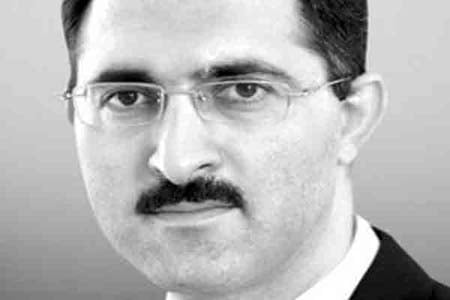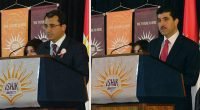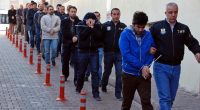Halki, pope, patriarch and Gülen

Date posted: September 5, 2014
The way Turkey’s chief political Islamist and new president, Recep Tayyip Erdoğan, has approached the reopening of the Halki seminary, a school that had trained Eastern Orthodox clergy for the Patriarchate for more than a century until it was forcibly shut down in 1971, represents a fundamental flaw in the thinking of so-called Islamists, who place more emphasis on symbolism than substance and like very much to employ divisive and hateful discourse as opposed to reaching out and embracing different faiths and cultures.
During his first visit to the Turkish Republic of Northern Cyprus (KKTC) as president this week, Erdoğan repeated the same narrative on the issue of the Halki seminary when he was questioned by a reporter during the press briefing, saying that the seminary can be reopened in a snap provided that Greece allows Muslims to restore two old Ottoman mosques in Athens. He also reiterated that Greek officials had not delivered on their promise to act on the restoration of these mosques. In short, Erdoğan was seeking refuge in the reciprocity principle in order to mask his desire to tout the rebuilding of the mosques in Athens as part of a major campaign to increase his popularity back in Turkey.
Although there may be some legal, constitutional and even treaty-based questions surrounding the status of the Halki seminary, almost all of them seem to have been sorted out by the Turkish government, with these different contingencies having been contemplated already. The decision is ultimately a political one, and it requires real engagement from Erdoğan to have enough political capital to make it happen. My sources in the Turkish capital told me that it was Erdoğan himself who took the Halki seminary item out at the last minute from the reform package the government unveiled in September of last year. It is clear that Erdoğan wants to manipulate the issue to please his Islamist base while creating a legacy for himself as the man who helped rebuild mosques in the Orthodox nation of Greece.
Let’s place that ambition of Erdoğan next to the construction of a giant mosque on Çamlıca Hill, on the Asian side of İstanbul, overlooking the Bosporus, one of the largest Islamic shrines to be built in Turkey since the founding of the republic in 1923. It was Erdoğan’s idea to build this monumental mosque that was later marketed as if local residents had actually wanted to have a mosque built in one of the few remaining green spots in a megacity of some 15 million residents. The highly controversial construction, which presents a poor imitation of Ottoman-era styles, has been met by criticism from environmentalists. Yet it was a building of grandeur that fits perfectly into Erdoğan’s legacy, with its heavy emphasis on symbolism.
Despite the fact that the Turkish Muslim community in Greece has been facing significant restrictions on its right to exercise religious freedom, this does not justify Erdoğan’s Turkey perpetuating its own injustices against its Greek minority by citing the reciprocity principle. As the saying goes, two wrongs simply do not make a right. Let the Greek government live with the shame of violating its own citizens’ rights, but why should we, as Turks, have to endure the same embarrassment caused by our successive governments ignoring what is essentially a fundamental human right of religious communities, which is not only guaranteed by pluralistic and liberal democracies but is also a deeply held Islamic value?
Perhaps this is yet another major difference between what the political Islamist Erdoğan preaches in his pursuit of exploiting religion for political objectives and what Islamic scholar Fethullah Gülen has been advocating to build bridges among faiths and cultures for years. Gülen, who has met with Ecumenical Orthodox Patriarch Bartholomeos several times, has repeatedly said that the Halki seminary must be opened to allow the Orthodox community to educate and train their clergy. And yet he was accused by pro-Erdoğan circles of cozying up to the patriarch in a secret plot to generate a strand of adulterated Islam.
In fact, it was the same political Islamist circles in Turkey that recently brought up Gülen’s meeting with Pope John Paul II in 1988 as part of a smear campaign to discredit the 76-year-old Islamic scholar, who has preached the importance of education, science, moderation, dialogue and outreach activities across religions and cultures throughout his life. The marginalizing and stigmatizing rhetoric one often sees with Erdoğan’s band of political Islamists has even overcome Turkey’s Directorate of Religious Affairs (Diyanet) — an official government agency that employs 140,000 employees, controls a $2.4-billion budget from the Treasury (equal to the budgets of all eight ministries put together) and oversees almost 85,000 mosques.
Hence, it was not surprising to hear rather unusual comments this week from Mehmet Görmez, the head of the Diyanet, against Pope Francis while speaking about attacks on mosques in Germany at the Diyanet’s Ankara headquarters during a visit by senior officials. All religious institutions, including the Vatican, should focus on these rising attacks against mosques, Görmez said, who then went on to belittle Pope Francis’ behavior. “This doesn’t happen through things like washing a young girl’s feet or arranging interfaith football games and tournaments,” Görmez stated, in an apparent reference to symbolic gestures displayed recently by Pope Francis. In March of 2013, the pope made international headlines by washing the feet of two Muslims at a juvenile detention center in Rome.
What is the point in lashing out at the pope when the world needs a united front against the rise of xenophobia, racism, militancy and religious fundamentalism? It can only be explained by the ideological blindness of political Islamists who have seized power in the current government of Turkey. They are abusing the religion to advance their political goals and perhaps to get back at Germany after the eavesdropping scandal that has strained ties.
But placing religion in the mix hurts Islam, in the first place, and betrays the teachings of Islam’s prophet, who always urged people to reach out to others’ hearts with gentleness and affection rather than coercion and extreme negativity. That is what the world needs, in fact, to stem the wave of extremist ideology taking place in our neighborhood. The terror and havoc created by the al-Qaeda-affiliated Islamic State of Iraq and the Levant (ISIL) in Iraq and Syria is a reminder of what might happen in other places if they do not present a strong and united front. Unfortunately, the political Islamists’ one-sided worldview, just as is the case with fundamentalist Christian and Jewish groups, is harming the effort to join forces for the common cause of achieving a better world.
Despite facing a relentless smear campaign, Gülen has been courageous enough to meet and talk with the pope, the patriarch and the chief rabbi of Turkey in order to advance interfaith dialogue. He has condemned terrorism in the strongest terms possible, including ISIL’s atrocities. The world surely needs more role models like Gülen, who has stood by his convictions and principles against the background of attacks by political Islamists, including Erdoğan, who only invoke religious symbolism for political purposes.
Source: Today's Zaman , September 5, 2014
Tags: Defamation of Hizmet | Hizmet and politics | Turkey |
























